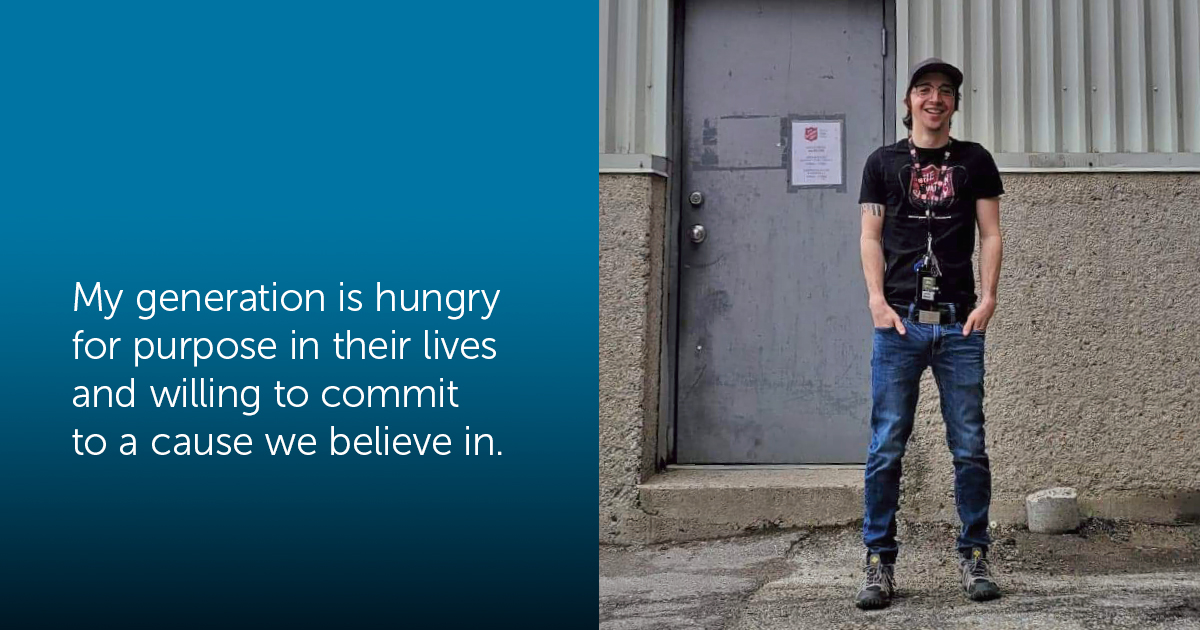Although I grew up in a Christian family, I never really felt like I belonged in church. As a teenager, questions of sexuality, peer pressure and the desire for social belonging were things we wrestled with outside of church, not at youth group. I remember thinking, Am I the only one more concerned about my school bully than I am about my church involvement? Is it wrong for me to bring up the issues I’m facing? Are they taboo or too complex? I began to feel like an outsider, and not welcomed as my true self.
The places I experienced belonging were outside the church, where I had permission to be the “real” Jordan, where I was not expected to dress or act a certain way, where it was OK to explore and ask questions.
One Sunday, our church band unexpectedly ended up without percussion. As a trained drummer, I offered to help. Although I followed Jesus, I didn’t belong to that church as a full member, so my offer was declined. This is not a good strategy to encourage young people or build a church. Experiences like these left a bad taste in my mouth, as I felt there was more emphasis on belonging in a certain way rather than being a follower of Jesus. Eventually, I left church behind me.
Years later, my parents, who are Salvation Army officers, were appointed to a “mission” corps with a focus on ministry to people who were experiencing homelessness, streetworkers and people who lived on the margins of the community. We offered community and family services, a drop-in café and a food bank. Witnessing the mission of The Salvation Army resonated with me so much that I completely changed my life plans to pursue joining this movement. I was now able to use my spiritual gifts, to serve marginalized people and to be among outsiders. I felt like I was living like Jesus.
I had finally found a place where faith was practiced in a way that made sense to me, where I could be part of The Salvation Army, where I felt I belonged. The focus wasn’t on how you looked on a Sunday, what group you belonged to or your position on a hierarchy. The ground was level—social and economic barriers seemed to disappear. Judgment was absent and all people were welcomed.
It was church taken right from the playbook of Jesus himself. He showed us what it meant to be the church—that it was for everyone. Jesus’ life demonstrates that following him is not about gathering for an hour once a week. It is a lifestyle in which we open ourselves to be vectors of God’s love to others through acts of service, prayer, worship and sacrifice. It is both who we are and the direction we are headed as Jesus’ followers.
I think I speak for the millennial generation to say that if we can recapture this sense of mission as The Salvation Army, we would see a revival and the return of passionate young adults to the church. My generation is hungry for purpose in their lives and willing to commit to a cause we believe in. We want to be our unique selves, without shame, and we are seeking meaningful relationships with other shamelessly unique people. We are not ashamed to have questions, doubts and fears, and we gravitate toward places where we feel our voices are heard. Ultimately, we want to positively impact our world.
“The Salvation Army exists to share the love of Jesus Christ, meet human needs and be a transforming influence in the communities of our world.” These words are powerful because this generation is passionate about social and economic justice. If we want to attract a new generation to take up the mission and transform our communities, we need to look to Jesus’ example and find ourselves among outsiders and other misfits. What would it mean for us if our churches looked more like a drop-in café, where we grow together through service, and everyone is welcomed just as they are? It may just change the course of this generation, like it did for my life.
Jordan Pinksen is the business manager at The Salvation Army Downtown East Community Church and Family Services in Toronto.
The places I experienced belonging were outside the church, where I had permission to be the “real” Jordan, where I was not expected to dress or act a certain way, where it was OK to explore and ask questions.
One Sunday, our church band unexpectedly ended up without percussion. As a trained drummer, I offered to help. Although I followed Jesus, I didn’t belong to that church as a full member, so my offer was declined. This is not a good strategy to encourage young people or build a church. Experiences like these left a bad taste in my mouth, as I felt there was more emphasis on belonging in a certain way rather than being a follower of Jesus. Eventually, I left church behind me.
Years later, my parents, who are Salvation Army officers, were appointed to a “mission” corps with a focus on ministry to people who were experiencing homelessness, streetworkers and people who lived on the margins of the community. We offered community and family services, a drop-in café and a food bank. Witnessing the mission of The Salvation Army resonated with me so much that I completely changed my life plans to pursue joining this movement. I was now able to use my spiritual gifts, to serve marginalized people and to be among outsiders. I felt like I was living like Jesus.
I had finally found a place where faith was practiced in a way that made sense to me, where I could be part of The Salvation Army, where I felt I belonged. The focus wasn’t on how you looked on a Sunday, what group you belonged to or your position on a hierarchy. The ground was level—social and economic barriers seemed to disappear. Judgment was absent and all people were welcomed.
It was church taken right from the playbook of Jesus himself. He showed us what it meant to be the church—that it was for everyone. Jesus’ life demonstrates that following him is not about gathering for an hour once a week. It is a lifestyle in which we open ourselves to be vectors of God’s love to others through acts of service, prayer, worship and sacrifice. It is both who we are and the direction we are headed as Jesus’ followers.
I think I speak for the millennial generation to say that if we can recapture this sense of mission as The Salvation Army, we would see a revival and the return of passionate young adults to the church. My generation is hungry for purpose in their lives and willing to commit to a cause we believe in. We want to be our unique selves, without shame, and we are seeking meaningful relationships with other shamelessly unique people. We are not ashamed to have questions, doubts and fears, and we gravitate toward places where we feel our voices are heard. Ultimately, we want to positively impact our world.
“The Salvation Army exists to share the love of Jesus Christ, meet human needs and be a transforming influence in the communities of our world.” These words are powerful because this generation is passionate about social and economic justice. If we want to attract a new generation to take up the mission and transform our communities, we need to look to Jesus’ example and find ourselves among outsiders and other misfits. What would it mean for us if our churches looked more like a drop-in café, where we grow together through service, and everyone is welcomed just as they are? It may just change the course of this generation, like it did for my life.
Jordan Pinksen is the business manager at The Salvation Army Downtown East Community Church and Family Services in Toronto.
This story is from:










Comment
On Monday, June 21, 2021, Paul Rideout said:
On Thursday, June 17, 2021, Colin Bain said:
On Wednesday, June 16, 2021, Catherine Evenden said:
On Tuesday, June 15, 2021, Sandra Van Gulik said:
On Tuesday, June 15, 2021, Sandra Van Gulik said:
On Tuesday, June 15, 2021, Natalia said:
Leave a Comment